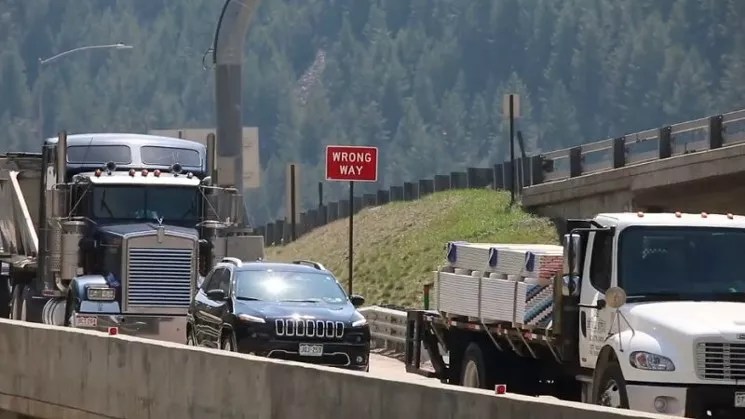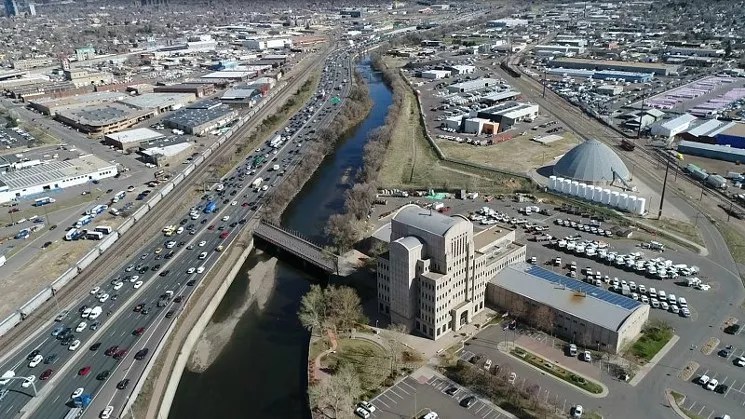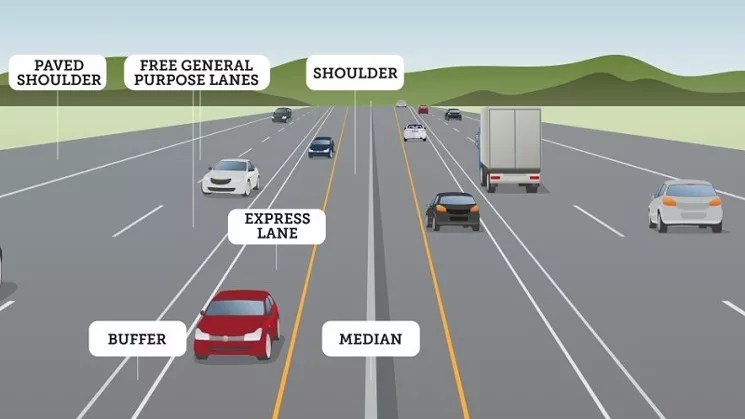
Colorado Department of Transportation

Audio By Carbonatix
The Election Day failure of two transportation measures, propositions 109 and 110, puts the Colorado Department of Transportation in a tough spot. There’s widespread agreement that the road and highway system across the state needs significant improvements pronto, but thanks to voters, there will be no new, or newly designated, money to pay for them.
The department has a passel of major new efforts ready to roll, including the Floyd Hill Interstate 70 project. But now, says Amy Ford, CDOT’s chief of advanced mobility, she and her colleagues must figure out how to motor ahead without help from the ballot box.
“It’s one of those situations where I think the public knows and we know that we have big challenges with transportation in the state of Colorado,” she notes. “People live it and sit in it every day. So it really comes down to all of us to think about how we can solve the problem together. Obviously, these challenges are funding-related in so many ways, and we have to work with our incoming governor and legislature to see how we tackle it. But 110 and 109 weren’t the answers the public was looking for.”
As a state agency, CDOT doesn’t endorse referendums. But in our recent post about phases two and three of the Valley Highway project on Interstate 25, Steve Sherman, the department’s resident engineer, conceded that the path to groundbreaking would be smoothed immeasurably by the passage of Proposition 110, also known as Let’s Go Colorado, which would have authorized a .62 percent tax increase (just over six cents on a ten-dollar purchase) expected to produce an estimated $767 million for transportation in year one, and likely higher annual amounts over the next two decades.
But 110, which was backed by a coalition of business interests led by the Metro Denver Chamber of Commerce, earned only about 40 percent support. Moreover, Proposition 109, dubbed Fix Our Damn Roads, which pushed a proposal to earmark preexisting funds for transportation without raising more taxes, did even worse, losing by around a 61-39 percent margin.

A section of I-25 CDOT wants to widen as part of the Valley Highway project. These efforts are currently unfunded, too.
Colorado Department of Transportation
Proposition 109, whose principal proponent was the Independence Institute’s Jon Caldara, was seen in many quarters as being less about fixing problems than killing Prop 110. But Ford doesn’t engage in the politics of the proposals, instead focusing on raw numbers. In her opinion, “The public didn’t say no to transportation. Both 110 and 109 had about 40 percent support. So does might mean 80 percent of people were tracking toward transportation?”
Her answer to this rhetorical question: “People are definitely focused on transportation as a core need. It’s just a question of the strategy that will get us there.”
One technique involves public-private partnerships of the sort that allowed the Central 70 project to get started. Ford adds, “In the past several months, we’ve been sharing with the public some of the things we have in development, and with I-25 South Gap, we were able to put together the funding and move it off the list.”
Other tactics would require action by the General Assembly. Ford acknowledges that “in the last three years, the legislature has put fiscal dollars into transportation through [2017’s] Senate Bill 267 and [2018’s] Senate Bill 1,” both of which are accessible below.
Moreover, she goes on, Senate Bill 1 includes something of a plan B embedded into its language: “When it passed last year, they included a section that said should 109 and 110 fail, the legislature would put a referred measure forward that would bond up to $2.3 billion to support legislation.”

Work on the I-25 South Gap project is underway..
Colorado Department of Transportation
By “referred measure,” Ford means another ballot issue – and after what happened on November 6, legislators may be gun-shy about this methodology. So she predicts that they’ll “take up that discussion and decide, ‘Is that the direction we still want to go, or have we changed our mind? And do the details still make sense?'”
The Taxpayer’s Bill of Rights, shorthanded as TABOR, requires voters to approve tax increases, and the cratering of 109 and 110, not to mention education-related Amendment 73, show how difficult that is to accomplish. As a result, Colorado legislators have been on the lookout for alternative approaches, and the aforementioned Senate Bill 267 came up with one by shifting hospital provider fees into a so-called enterprise fund exempt from TABOR. Ford also cites 2009 FASTER legislation that hiked vehicle registration fees that were then “dedicated to funding transportation – specifically safety and bridges. It generates around $200 million a year” that’s not governed by TABOR, either.
The Independence Institute’s Caldara argues that both of these fees are actually taxes and therefore violate the state constitution. But they remain in place at present, and Ford feels new transportation legislation along these lines “is always up for discussion.”
She concedes that “some people think CDOT should be more efficient with our dollars. But when we describe the reality of where we are, they realize that we really are doing less with less. It’s a question of how you solve that. These two ballot issues brought some possible solutions to the public, but they obviously decided that neither was quite right.”
Nonetheless, Ford estimates that CDOT has “a billion-dollar-a-year funding shortfall – $800 million or so for capital projects and $200 million for maintenance. And those aren’t going away. We have a very real need, and we have to do something about it.”
Click to read 2018’s Senate Bill 1 and 2017’s Senate Bill 267.